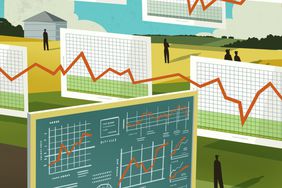:max_bytes(150000):strip_icc()/MoneyinHand-CloseUp-d068f56651734c6abfa338ef6dd438c5.jpg)
Recently, a farmer and client of mine passed away. He was a successful farmer with several hundred acres, worth millions of dollars.
The thing that struck me as unusual and important was the fact that the farm was only half of his wealth. The other half consisted of stocks, bonds, mutual funds, and certificates of deposit. To sum it up, he was well diversified, debt-free, and no commodity price downturn was ever going to run him out of business.
After looking at people's tax returns for 25 years, I have noticed that investors tend to be real estate oriented or stock oriented with very little cross-over. In fact, a lot of real estate investors don't own one share of stock.
If you asked them why, they would say, "I understand real estate. I don't understand the stock market, so I stay out of it." Staying out of investments you don't understand is always a good idea. However, we can learn something new every day of our lives, and most of us can learn about paper assets and utilize them to diversify our income stream.
When you get a hold of some investable cash, consider investing it in the stocks that are easiest to monitor and ones you believe will succeed.
For instance, in the accounting business, I knew which software companies we could live without and which ones we could not. So, investing in the maker of Quickbooks was a "no-brainer" for me. Likewise, there are corporations locked into the ag industry you may have a lot of faith in.
Here is a short list of some of the biggest publicly traded agricultural corporations: ADM, DowDupont, Monsanto, John Deere, Syngenta, CNH Industrial, The Mosaic Company, Agco, BASF, and Tractor Supply Co. Some of these pay a dividend as high as 3.2%.
You never want to buy just one or two stocks - too much individual security risk. If you don't have the money to get into 20 or more stocks, then stick with mutual funds, which are a ready-made basket of stocks.
Often times, a mutual fund will own more than 100 stocks, which gives you big diversification with small dollars. Bonds are another way to keep the income flowing. At the moment, there are corporate bonds paying taxable interest above 4.5% and municipal bonds paying tax-free interest above 4%. Certificates of deposit have been pretty uninteresting for over 10 years with many paying less than 1%. However, if they get back up to 2% or more, they'll deserve a look from conservative investors.
When you are investing, think about the future, not just the present. Try not to invest in things like pay-phones, VCR's, typewriters, and phone-books. The future of agriculture has driverless tractors, wireless water sensors, drones, robotic milking systems, custom fertilization, production monitoring software, fruit picking robots, artificial intelligence, and more.
Besides investing, there are the traditional ways to supplement farm income, such as off-farm jobs.
If you can find one that allows flexibility for planting and harvesting, that's great. (I've always thought high-school biology teacher would be a good one for a farmer.) Working as a contractor rather than a 9-5 employee can offer the kind of flexibility you need. Consider contracting out the skills and equipment you already have. Many farmers have skid-steers and backhoes that can be used for excavation projects, and those projects can be worked into slow times at the farm. Most farmers have welding machines and welding skills, which are valuable in today's marketplace.
If you're comfortable repairing heavy equipment, there is definitely a market for people to repair skid-steers, backhoes, and construction equipment. Repair shop rates can be $100/hour!









